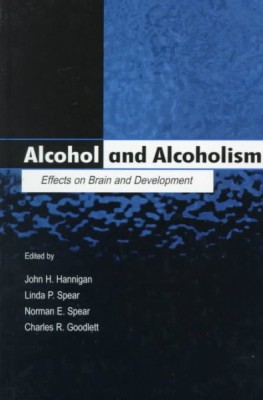| Alcohol and Alcoholism: Effects on Brain and Development Contributor(s): Hannigan, John H. (Editor), Spear, Linda P. (Editor), Spear, Norman E. (Editor) |
|
 |
ISBN: 0805826866 ISBN-13: 9780805826869 Publisher: Psychology Press OUR PRICE: $161.50 Product Type: Hardcover - Other Formats Published: February 1999 Annotation: Recent years have seen more systematic investigations of the consequences of prenatal and early postnatal exposure to alcohol for brain and behavioral development. Offers an overview of what they have shown, and points out directions for further research |
| Additional Information |
| BISAC Categories: - Psychology | Neuropsychology - Medical | Perinatology & Neonatology |
| Dewey: 618.326 |
| LCCN: 98017719 |
| Lexile Measure: 1460 |
| Physical Information: 0.93" H x 5.94" W x 9.38" (1.37 lbs) 304 pages |
| Descriptions, Reviews, Etc. |
| Publisher Description: This is the first volume that focuses on the lifespan neurobehavioral factors likely to determine susceptibility to alcohol abuse and its consequences. The chapters offer careful analysis of the effects of ethanol on the fetus, the infant, the adolescent, and the adult. The authors include behavioral neuroscientists and clinical neuropsychologists. Their topics range from the neurochemical and neuroanatomical consequences of prenatal alcohol to the cognitive consequences of prenatal alcohol on preschool and school-age children. The impact of genetics on sensitivity to alcohol is considered in terms of analytic tests using techniques of behavioral genetics and molecular biology. The consequences of exposure to alcohol during breastfeeding are described in experiments with human infants. The alcoholism that develops in adulthood is analyzed through the experimental study of relapse from alcohol deprivation and assessment of neuropsychological impairments and treatment for alcoholics. Drawing on extensive research that has applied techniques from molecular neurobiology and tests of learning and memory to the clinical assessment and treatment of alcoholics. The volume answers recent questions raised by the National Institute of Alcohol Abuse and Alcoholism and the National Institute of Drug Abuse about the role of early experience in susceptibility to later abuse of alcohol and other drugs. Although epidemiological studies can describe the problem, solutions in terms of mechanisms that mediate these effects will be found only with the kinds of experimentally oriented approaches the chapter authors describe. |